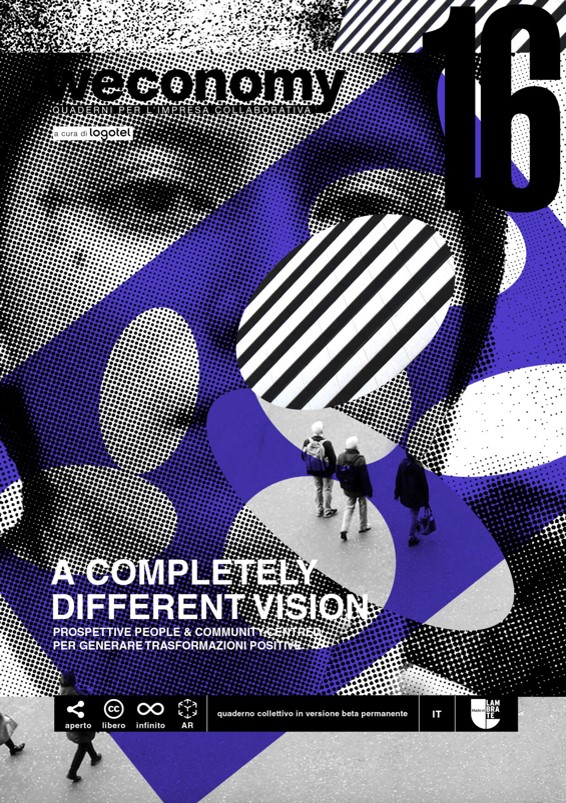Sono anni strani questi. La digitalizzazione sta dando i suoi frutti. Sappiamo tutto dei clienti, sappiamo quanto e dove spendono, se sono soddisfatti o meno, come cliccano e quanti secondi stanno su una pagina prima di tradire il nostro amore per saltare sui contenuti di altri. Abbiamo messo i clienti al centro e spendiamo fortune per tenerli lì. Spendiamo per attirarli, per servirli, per inseguirli, per riprenderli (ma solo se ci è vantaggioso). Lo facciamo usando tecnologie e piattaforme che promettono produttività e ci apprestiamo a fare outsourcing di intelligenza perché la promessa artificiale è troppo disruptive e game changer per lasciarla agli altri. Nei bilanci si distinguono le voci di investimento e nei piani industriali si mettono in mostra le risorse che verranno investite per innovare, per diventare più veloci ed efficienti. Ok. Ci sta.
E poi c’è il people. Se ne parla tanto, tantissimo. Si rifanno gli spazi per renderli più smart come il lavoro che devono accogliere, si creano servizi ed eventi “wow” super instagrammabili per fare employer branding, si rilanciano modelli di leadership generativi, inclusivi, gentili. E ci mancherebbe! È tutto giusto. Ma nei bilanci il costo del people è una voce che si cerca di ottimizzare e contenere. Soprattutto nel conto economico dove una buona performance in termini di costo del personale è un toccasana per fare EBITDA, per dare più valore all’azienda. Già, il valore! Tutto per il valore.
Nelle organizzazioni si sta perdendo il senso
Time out! Riavvolgiamo il nastro e cerchiamo cosa ci stiamo perdendo. Cosa rende poco incisiva e curata la proposta del nostro commerciale quando incontra il cliente? Cosa fa sì che innoviamo usando tecnologie a disposizione anche di altri creando cose nuove, anziché qualcosa di già visto? Quale ingrediente scarso rende sciapi i meeting di progetto? Cosa rende simili e atone le promesse che aziende diverse fanno quando cercano di reclutare nuove leve? Cosa non fa scattare la scintilla che accende la motivazione nella giovane che sta imparando il mestiere da un collega esperto?
Si indebolisce, si standardizza, si sfibra perché dato per scontato finché dimenticato: il senso. Nelle organizzazioni si sta perdendo il “senso”. Il senso non è solo il perché che differenzia, ma l’anima che muove e attiva. Il senso è una proprietà emergente di una comunità che c’è. Di un insieme di persone che si conoscono, scambiano, entrano in contatto per creare legami e collaborare al di là di ruoli, budget e KPI. Il senso si passa come la cultura, con contatti e rituali, con storie raccontate e storie da vivere insieme. Lo spirito di comunità è il vettore del senso.
Dobbiamo creare comunità
Un’organizzazione che vive come una comunità genera una forza magnetica che le permette di trattenere chi vale, di attirare persone, di farle crescere e prolungare la loro esperienza. Se è vero che le nuove generazioni sono più nomadi, è anche vero che chi saprà trattenerle per un tempo medio più lungo raccoglierà migliori frutti di chi, invece, è nella trappola della fermata del bus. Ogni mese tanti salgono e tanti scendono dalla corsa. Senza senso.
Dobbiamo creare comunità, dobbiamo alimentare tribe di mestieri, dobbiamo costruire palinsesti e servizi che mischiano e “matchano” competenze, interessi, saperi, desideri diversi al di là del confine di funzione o progetto. Ogni giorno va alimentato il racconto che collega l’azione del singolo con il purpose. Introdurre flussi autonomi e liberi di contatti e relazioni che interpretano e danno energia a nuove mode, linguaggi e manufatti creati da chi sa e non solo da chi deve farlo.
Se siamo bravi a spiegare a un cliente perché dovrebbe scegliere noi, dobbiamo diventare ancora più forti nel trasmettere perché Marina o Ahmed dovrebbero entrare nel nostro team, al di là delle scontate feature contrattuali (retribuzione, benefit, welfare ecc.).
Un’organizzazione animata e dinamica come una community vale di più
Sono anni strani questi. Perché si valutano le aziende sulla base di un EBITDA moltiplicato, ma non esiste nessun indicatore di bilancio che esprime se la squadra che genera quel dato è forte come una comunità di destino, coesa, mossa da un senso magnetico e rigenerativo che darà maggiori garanzie a quella performance di mantenersi nel futuro. Quanto vale un’azienda? Quanto vale una organizzazione? Se è animata e dinamica come una community vale molto di più di una che non lo è più, a parità di EBITDA! Sono 22 anni che in Logotel ci occupiamo di community e di senso. E mai come adesso sentiamo che ce ne è bisogno.





